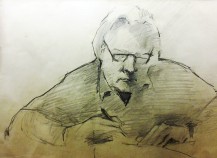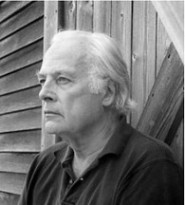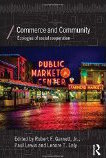What Kind of Problem a City Is
In her work the Life and Death of Great American Cities, Jane Jacobs details the complex, dramatic patterns of urban life.All posts categorized with: Front page

How good (and bad) ideas spread
Despite technology’s role in distributing information, the diffusion of ideas is still essentially a social phenomenon.
Making Sense of Social Complexity
How might we as individuals, groups, and society as a whole might make use of deeply human tools—from psychology to social learning—to make sense of the complex world in which we live?
The Future of Work
While policymakers have a role in building a proper scaffolding for workers, what role might philanthropy, business, and social entrepreneurs play in ensuring that the individuals of our society not only survive the transition, but thrive in the midst of it?
Loneliness and Its Antidotes
This collection of articles draws attention to the loneliness that pervades our society while considering what antidotes might serve to build meaningful connections between us.
Polycentric Innovation
A selection of articles exploring various aspects of polycentric innovation and the conditions necessary that allow entrepreneurs of all stripes to pursue ways to improve their industry, the culture, and their communities.
How Does Technology Enhance or Diminish Our Capacity for Human Flourishing?
How does technology, and the attention it requires, enhance or diminish our capacity for creativity, community, and ultimately human flourishing?
The Transformation of Philanthropy: Causes, Processes, and Foreseeable Results
Philanthropy is undergoing a classic paradigm shift—a particular kind of historical change, which has a usefully intelligible character and direction. The generic phenomenon was identified by Thomas Kuhn, in The Structure of Scientific Revolutions (Chicago, 1962), and was readily applied in other fields of historical scholarship, especially to describe revolutionary change. More broadly applied, it refers to the total transformation of a mature field of human endeavor—“mature” in the sense of fully and coherently organized in its conceptualization, methodology, technology, and demographics, and fitting into its broader historical milieu, including technology, economy, societal infrastructure, cultural norms, and institutions.
From Big State and Small Society, to Small State and Big Society: Reflections on Richard Cornuelle’s Healing America
If we rethink the scope of government, then by necessity we rethink its scale. We don’t get thinner by tightening our belt, but as we get thinner, we require a smaller belt.
Midwestern Liberal: A Smithian “Reclaiming of the American Dream”
Introduction At my first Philanthropic Enterprise colloquium in 2004, we explored the work of economist Kenneth Boulding.
Consequentialism and Philanthropy: The Legacy of a Revolutionary
Insofar as civility—the virtue of the citizen—requires disinterested interest in what is right not for the direct benefit of the individual but for the country, the generosity of philanthropy achieves significance far beyond that of charity.




